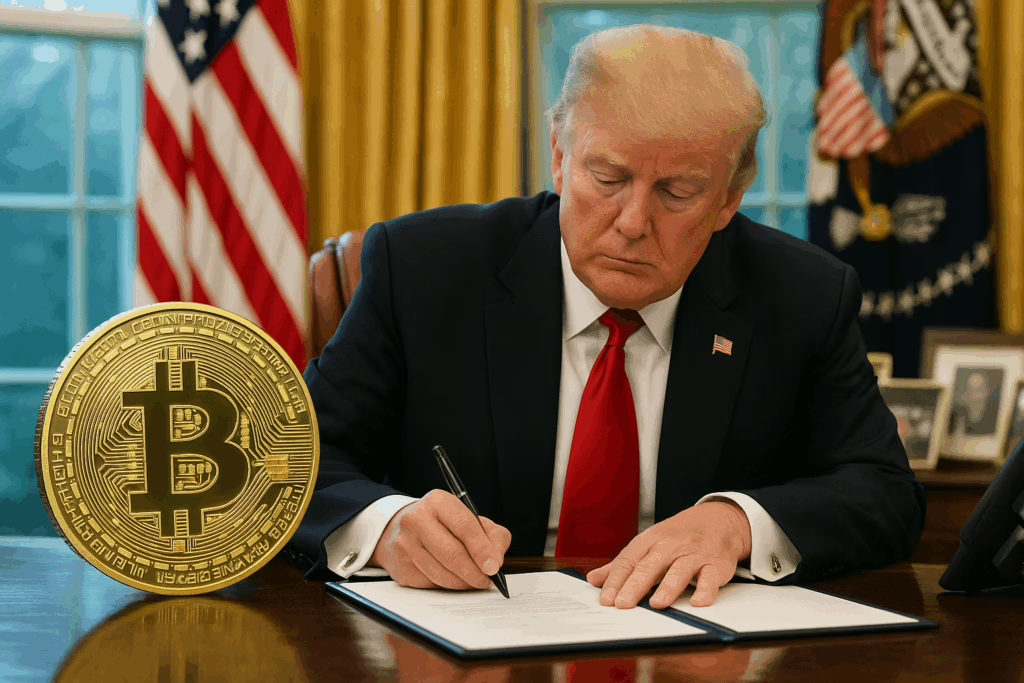
- U.S. President to sign executive order enabling cryptocurrencies, real estate, and private equity to be included in 401(k) retirement plans, potentially unlocking access to trillions in retirement savings.
- Recent signing of the GENIUS Act establishes a clear regulatory framework for stablecoins in the U.S.—a major legislative milestone.
- Developments suggest deepening crypto integration into mainstream finance, as traditional institutions prepare to accommodate digital assets within established retirement and investment platforms.
In what may prove a defining moment for digital assets, the White House announced on August 7, 2025, plans to sign an executive order that would allow cryptocurrencies, alongside private equity and real estate, to be offered within 401(k) retirement plans. This bold regulatory pivot has sparked renewed investor confidence and marks a dramatic shift in U.S. policy toward embracing digital finance.
Immediately following the announcement, markets reacted positively. Bitcoin climbed nearly 2% to surpass $116,500, while Ethereum surged more than 7% above $3,860. Even spot bitcoin ETFs and Coinbase stock showed notable gains, underscoring expectations that mainstream financial platforms may soon integrate crypto offerings.
This policy shift arrives on the heels of President Trump signing the GENIUS Act earlier today, which establishes a comprehensive regulatory framework for stablecoins. The Act mandates one-to-one backing by U.S. dollars or low-risk assets and aims to bring transparency and oversight to the stablecoin market.
Michael Novogratz, CEO of Galaxy Digital, emphasized that the inclusion of crypto in retirement accounts through platforms such as Fidelity and T. Rowe Price will extend digital asset participation well beyond crypto-native investors.
While the move has energized markets, it also raises cautionary flags. Critics warn that exposing retirement assets to inherently volatile digital currencies could add risk to individuals’ long-term savings. The full implications, both institutional and personal, remain to be seen.
Balanced Analysis
- Institutional implications: By legitimizing crypto within 401(k) plans, policymakers are positioning digital assets alongside traditional instruments like stocks and bonds. For firms managing retirement funds, this signals a seismic shift in asset allocation strategy.
- Regulatory evolution: The GENIUS Act’s stablecoin regulations offer a clearer legal path, encouraging continued innovation while safeguarding consumers. Together with the 401(k) policy change, the actions reflect a coordinated regulatory overhaul.
- Controversies and risks: Skeptics point to market volatility as a threat to retiree stability. How regulators and administrators will manage fiduciary responsibilities around such high-risk assets remains a major unknown.
Broader Significance and Outlook
If the executive order moves forward as expected, it could channel trillions in retirement capital into the crypto ecosystem over time. This would not only elevate the asset class but also redefine public perception—transforming digital currencies from fringe bets into staples of diversified portfolios.
Looking ahead, implementation details will matter. Questions remain: Will there be limits on crypto holdings within plans? How will administrators assess suitability? Will regulatory oversight evolve to address fiduciary standards and consumer protection?





